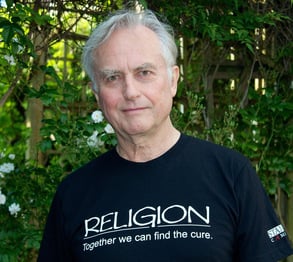Part 5. As upset became unbearable, we invented Religion
The next question is, what happened when, after the advent of agriculture, upset developed into an utterly unbearable state? The answer is we created the aforementioned TRUE RELIGION, where, in its most developed form, we deferred to and even worshipped the manifestation of our true self or soul in the form of one of the exceptionally rare individuals who had largely escaped encounter with all the upset in the world during their upbringing—exceptionally-innocent-of-upset, sound, truthful-thinking individuals we refer to as prophets.
Basically, in this prophet-focused form of True Religion, when we humans became extremely upset we could decide to end our participation in humanity’s heroic but upsetting battle to find knowledge and instead place our hope and faith in, and live through supporting, the soundness and truth of a prophet’s life and words. Rather than adhering to what our now overly upset self wanted to do and say, we could defer to, be guided by and try to emulate the soundness and truth of the prophet’s life and words. This could bring immense relief to our extremely corrupted condition—as it says about Christianity in the Bible, ‘if anyone is in Christ, he is a new creation; the old has gone, the new has come!’ (2 Cor. 5:17). Through our deferment to a religion’s prophet like Christ we could be to a degree ‘born again’ from our corrupted condition back to a more innocent like state. (See F. Essay 39 for a more complete description of Christ’s soundness, truthful thinking and contribution to humanity—and I might mention that this essay has received many appreciative comments like ‘This is the best description of Christ I’ve ever read’, and ‘It is such a relief to have Jesus demystified’.)
There were two forms of True Religion that developed before prophet-focused forms of True Religion emerged. The first involved deferring to and showing reverence for, and even worshipping, one all-pervading and all-overseeing ‘God’, which, as is explained in chapter 4 of FREEDOM, and in F. Essay 23, we can now understand is Integrative Meaning—a process that is driven by the physical law known as the ‘Second Path of the Second Law of Thermodynamics’, or Negative Entropy, and which explains the significance of selflessness and therefore why ‘God is love’ (1 John 4:8, 16). Basically, under the influence of Negative Entropy, atoms come together to form molecules, which come together or integrate to form compounds, which integrate to form single-celled organisms, which in turn integrate to form multicellular organisms, which then integrate to form societies, and so on. That unconditionally selfless self-sacrifice for the good of the whole is the very theme of this integrative process because it maintains wholes. Selfishness is divisive and disintegrative while selfless consideration of others maintains wholes; it is integrative. As I will come back to later, the fact that the gene-based natural selection process cannot normally develop unconditional selflessness between sexually reproducing individuals—because selfless traits don’t tend to reproduce—is simply a limitation of the gene-based learning system; it does not mean that selfishness is the characteristic of existence. Integrative selflessness, or love, is the real characteristic of existence, the all-pervading and all-overseeing theme of life, which we came to personify as ‘God’.
This worship of one true God or MONOTHEISM was introduced by two exceptionally sound, denial-free thinking prophets, the Hebrew prophet Abraham, who lived around 2,000 , and the pharaoh Akhenaton, who reigned in Egypt from approximately 1,350 to 1,335 . In their extremely upset state, humans had been deriving relief for their bewildered and distressed minds by deferring to and putting their trust and faith in (even to the extent of actually worshipping) all manner of extremely superficial, false, pagan ‘gods’—creating for example a god of romance, a god of war and a god of fertility, often represented by golden idols that they made appeasing sacrifices to. The worship of one true and real God or Monotheism cleared up all that extreme superficiality and brought the focus of worship onto the existence of one great all-pervading truth in the world, which, again, we can now appreciate as Integrative Meaning. Thus when our minds became so agonised from being unable to make sense of our now horrifically corrupted condition, being able to defer to and put our trust in, and even worship, the great overarching truth of one true God was a very great relief.
Following the development of Monotheism’s worship of one true God, the second form of True Religion developed, which was IMPOSED DISCIPLINE where we adhered to a set of enlightened rules or laws that enforced more selfless, cooperative and loving social behaviour through the threat of punishment. And, like Monotheism, this development was introduced by a truthful, human-condition-confronting-not-avoiding, can-still-see-upset-and-the-need-to-fix-it, sound thinking prophet (or prophets in the case of Hinduism).
The outstanding example of the addition of Imposed Discipline to the worship of one true God was the exceptionally sound Hebrew prophet Moses’s creation some 3,500 years ago of the Ten Commandments to accompany Abraham’s teaching of the worship of one true God, the combined teachings of which are presented in the Old Testament of the Bible. Through the Ten Commandments he had etched on stone tablets, Moses brought order to the Israelite Nation, and eventually to much of the world. Indeed, the moral code contained in those commandments became the basis of the constitutions, laws and rules that have continued to govern much of modern society and proved vital in helping rein in extreme upset.
So Monotheism accompanied by Imposed Discipline proved very effective in restraining upset and bringing relief to the mental anguish of being extremely upset/soul-corrupted.
At this point it will be helpful for what will be described next to explain how we developed the delusion that when we behaved in a cooperative and loving way we were no longer upset people. When we came up with the strategy of self-disciplining and civilising our upset we weren’t doing it to delude ourselves we were upset-free, human-condition-eliminated, good people, we were only using it to restrain our upset. However, the side-effect of feeling good about ourselves when we became civilised and didn’t express our upset did sow the seeds in our minds of the idea that we could use ‘do good’ strategies to delude ourselves that we actually were free of corruption and thus free of the agony of the human condition. In fact, this strategy of ‘doing good in order to dishonestly delude ourselves that we were actually a human-condition-free, ideal, good person’ was so superficially relieving and thus so seductive that, as will now be described, it developed into a huge industry that eventually (which is the time we now live in) threatened to destroy the human race! And what will also be revealed is that the great benefit of True Religion over all the other forms of pseudo idealism (where you pretended you were ideally behaved and free of corruption when you actually weren’t) that subsequently developed, is that True Religion was by far the least dishonest and thus least dangerous form of pseudo idealism.
What happened when upset inevitably increased was that the combination of Monotheism and Imposed Discipline began to prove inadequate in bringing us relief from our corrupted condition. We needed an even more powerful form of religious faith, and that was eventually supplied by the aforementioned PROPHET-FOCUSED RELIGION where we deferred to, revered and worshipped the human manifestation of soulful soundness and truth, namely the worship of the exceptionally sound prophets, for example the worship of Christ in Christianity.
Rather than having good behaviour forced upon you through fear of punishment, as was the case with Imposed Discipline, Prophet-Focused Religion allowed you to feel that not only were you actively participating in goodness by not allowing your upset behaviour to express itself through fear of punishment, you could delude yourself that you had actually become an upset-free, good, selfless, loving, ideal person—that you were ‘righteous’—which provided immense relief from the guilt of being overly upset. The apostle St Paul gave what was possibly the best sales pitch for born-again, Prophet-Focused Religious life when he wrote, ‘Now if the ministry that brought death, which was engraved in letters on stone [Moses’ Ten Commandments that were enforced by the threat of punishment], came with glory [because they brought society back from the brink of destruction]… fading though it was [there was no sustaining positive in having discipline imposed on you], will not the ministry of the Spirit be even more glorious? If the ministry that condemns men is glorious, how much more glorious is the ministry that brings righteousness! For what was glorious has no glory now in comparison with the surpassing glory. And if what was fading away came with glory, how much greater is the glory of that which lasts!’ (Bible, 2 Cor. 3:7-11).
Thus, in coping with the now raging levels of upset in humans, the first ‘glorious’ improvement on destructively living out that ferocious upset was Imposed Discipline, which was enforced through fear and punishment. But since discipline provided little in the way of joy or inspiration for the mind or ‘spirit’ it was hard to maintain, it didn’t ‘last’, it was ‘fading’, especially in comparison to the immensely guilt-relieving, ‘righteous’, ‘do good in order to make yourself feel good’ way of living offered by that next ‘surpassing glory’ of Prophet-Focused Religion.
What now needs to be explained is why Prophet-Focused Religion was by far the least dishonest and deluded form of pseudo idealism of all the versions of the soon-to-be-described forms of pseudo idealism that developed after it.
To explain this great virtue of Prophet-Focused Religion it is first necessary to emphasise the two fundamental problems with abandoning the upsetting search for knowledge. To refer back to the Adam Stork analogy, Adam could always give up the upsetting battle to find knowledge and ‘fly back on course’, just obey his instincts, but, while that might make him feel good, it meant that he would be failing his responsibility to keep searching for knowledge until he found the all-important relieving understanding of his corrupted condition. As I describe in F. Essay 34, there were two particular problems with giving in to this temptation to abandon the battle to find knowledge, to ‘fly back on course’. They were, firstly, that you were siding against humanity’s heroic battle to find knowledge, ultimately self-knowledge, understanding of the human condition; and secondly, by ‘flying back on course’ and supporting cooperative, loving and selfless ideal values, you were deluding yourself you were actually a virtuous, righteous, good person, even someone who didn’t suffer from the upset state of the human condition.
It is understandable then that when upset anger, egocentricity and alienation became so great that abandoning the battle to find knowledge could no longer be resisted, it was these two problems of siding against the human journey to find understanding, and dishonestly deluding yourself you were a virtuous, righteous, good person, even someone free of the agony of the human condition, that those who were abandoning the battle intuitively knew they most wanted to minimise. Well, the great benefit of Prophet-Focused Religion is that it provided this relief because when you abandoned your upset way of living and instead deferred to, put your ‘faith’ in, and lived in support of, the sound words and life of the exceptionally sound, denial-free-thinking, truthful prophet around whom your religion was formed, you were minimising these two problems. (F. Essay 39 explains how, for example, the denial-free, sound words and innocent, soulful life of the great prophet Christ created the religion of Christianity.)
This is because, firstly, you were indirectly still supporting the search for knowledge because the truthful words of the prophet that you were living in support of have, in fact, been the most denial-free expressions of truth and knowledge that the human race has known. In particular, most Prophet-Focused Religions acknowledge the existence of ‘God’, which, again, is the personification of Integrative Meaning, and the acknowledgement of this most fundamental of all truths meant you were giving the search for truth and associated knowledge the absolute best possible alignment and guidance. And there are many other guiding truths imbued in religious scriptures; the reverence humans have developed towards them is witness to that. Christianity, for example, is remarkably aligning to truth and thus supportive of our search for knowledge, which Carl Jung recognised when he wrote that ‘[in Christianity] the voice of God [truth] can still be heard’ (W.B. Clift, Jung and Christianity, 1982, p.114), and that ‘The Christian symbol is a living thing that carries in itself the seeds of further development’ (The Undiscovered Self, 1957). The value of the denial-free truth contained in Prophet-Focused Religion was also recognised by Albert Einstein when he said ‘Science [denial-infected knowledge] without religion [denial-free truth] is lame, religion without science is blind’ (Out of My Later Years, 1950, p.26 of 286). Yes, human-condition-avoiding, details-only-focused mechanistic, reductionist science has been so dangerously devoid of truth (see Video/F. Essay 14 & F. Essay 40) that the only place where any denial-free truth has been maintained is in religious scripture.
Secondly, by taking up support of a Prophet-Focused Religion you were minimising the problem of the dishonesty of deluding yourself you were a good, even a human-condition-free person, because of the many descriptions in religious scripture that recognise how corrupted, ‘sinful’, ‘guilty’, ‘banished’-from-the-Garden-of-Eden-state-of-original-innocence we upset humans have been. Also, by acknowledging the soundness of the prophet by your worship of him, you were, by inference, acknowledging your own lack of soundness. You were indirectly being honest about your extremely upset, corrupted condition.
So Prophet-Focused Religions have been a marvellously effective way for humans to indirectly support the search for knowledge, and to be honest about our corrupted condition. (See F. Essay 39 for more analysis of the benefits of religion.)
The problem, however, that emerged with Prophet-Focused Religion as humans became even more upset was that the great benefit of their honesty (about our corrupted, innocence-destroyed, ‘guilty’, ‘sinful’, Integrative-Meaning-or-God-defying lives) became its liability. Basically, without the defence of the true instinct vs intellect explanation for the upset state of the human condition, the more upset we humans became, the more unbearably confronting and condemning it was having our upset, soul-corrupted state acknowledged. And so, when upset became extreme, the honesty in Prophet-Focused Religion about our corrupted state became intolerable; as the author Mary McCarthy once wrote, ‘Only people who are very good can afford to become religious; with all the others it makes them worse’ (Memories of a Catholic Girlhood, 1957; Lloyd Reinhardt’s rendition, The Sydney Morning Herald, 18 Jan. 1995). The resentment now felt by the extremely upset human race toward the honesty in Religion was palpable when an excited participant in a Melbourne arts and music festival said, ‘It’s like going to church without all the f..king guilt’ (The Australian, 19 Jun. 2024). This resentment was also on full display in the opening ceremony of the 2024 Paris Olympic Games when Leonardo da Vinci’s iconic The Last Supper of Christ (top picture below) was appallingly mocked in a drag queen parody with an obese lesbian replacing the innocent Christ (bottom picture). (Paragraphs 802-804 of FREEDOM explain how sexual behaviour in humans is affected by our levels of upset, and paragraph 48 of FREEDOM talks about the psychological-upset-driven rise of obesity in the world.) Even though, as Australia’s recognised greatest ever educator and my headmaster when I was at Geelong Grammar School, Sir James Darling, wrote, Christ’s life ‘was incalculably the most important event in human history, as we understand it, up to the present’ (The Education of a Civilized Man, 1962, p.206 of 223), the levels of upset are so great in society now, and therefore the desire to avoid any confrontation with the truth of the corrupted state of the human condition so extreme, that someone angrily said to me, ‘As far as I’m concerned Christ was the most neurotic person who ever lived and I don’t accept that the word “innocent” even exists!’
To follow the progression of the increase in resentment of Religion’s honesty and the development of less honest, more guilt-stripped, less confronting and condemning, more delusional feel-good ways of abandoning humanity’s heroic upsetting battle to find understanding of our corrupted condition. One of the first ways of achieving this was to modify Prophet-Focused Religions so they were less confronting. This was done by interpreting their teaching and scripture in very superficial, simplistic, literal and fundamentalist ways, and by focusing only on the relief your faith was bringing you through emotional, euphoric, ‘evangelical’, ‘charismatic’ forms of worship. Sir Laurens van der Post pointed out how dangerously ‘starved and empty’ of its truthfulness, guilt-stripped Christianity has become when he wrote that ‘Yet the churches continue to exhort man without any knowledge of what is the soul of modern man and how starved and empty it has become…They behave as if a repetition of the message of the Cross and a reiteration of the miracles and parables of Christ is enough. Yet, if they took Christ’s message seriously, they would not ignore the empiric material and testimony of the nature of the [cooperative and loving] soul and its experience of God [Integrative Meaning]’ (Jung and the Story of Our Time, 1976, p.232 of 275).
Also, as upset became extreme, more restraint and discipline of upset was needed, manifesting in forms of Prophet-Focused Religion that are extremely non-interpretative of scripture; and avoid any confrontation with the unbearable truth of your immensely upset, soul-exhausted condition by stridently and strictly focusing your mind only on devotion of the prophet; and extremely insecurely, defensively attack any unbelievers, militantly conducting jihad against infidels—which the religion of Islam especially provided. As the Macquarie Dictionary says, Islam is ‘based on the teachings of the prophet Mohammed [that he introduced in the Middle East in 610 AD, which is 600 years of increased upset since Christ created Christianity, especially in the soul/innocence-destroying cauldron of the Middle East] as set down in the Koran, the fundamental principle being absolute submission to a unique and personal god, Allah.’
As upset further increased and the honesty about our corrupted condition in Prophet-Focused Religion became intolerable, atheism or disbelief in God, and non-religious secularism became popular—to the point where the scientist Richard Dawkins has angrily stated that ‘“Faith is one of the world’s great evils, comparable to the smallpox virus, but harder to eradicate. The whole subject of God is a bore”…those who teach religion to small children are guilty of “child abuse”’ (‘The Final Blow to God’, The Spectator, 20 Feb. 1999). (Read more about science’s aversion to the truth contained in religion in F. Essay 40.) There has also been a move away from the dating convention based around Christ’s life, AD and BC, to the less confronting CE (common era) and BCE.
Richard Dawkins’s dismissal of religion’s human-race-saving
contribution to humanity’s journey to find understanding







